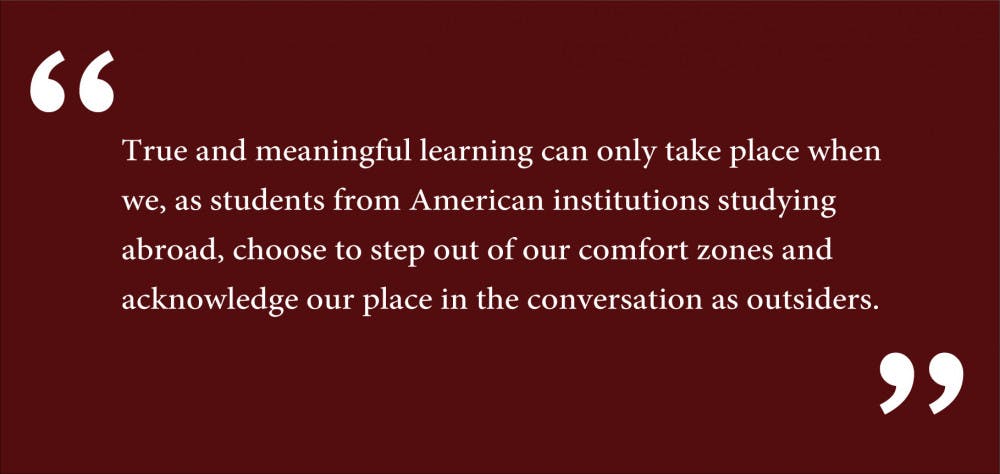In my study abroad program this semester in Amman, Jordan, each student is placed with a local host family. Both of my host parents, Issa and Mary, are Palestinian and grew up in Palestine prior to moving to Jordan. This is not uncommon, as it is estimated that at least half of Jordan’s population has Palestinian ancestry. However, five minutes into our first conversation, I realized how unprepared and uninformed I was to talk about my host parents’ background with them. I immediately felt like an outsider.
Before studying abroad, I had taken one class at Brown about the Palestine and Israel conflict, but all that resurfaced when I anxiously raked my brain during our first family dinner were inapplicable generalities about the Palestine Liberation Organization and Israeli Defense Force. As I continued to converse with Mary and Issa over the next few weeks, I increasingly became aware of how little I knew about Palestinian culture, heritage and the unwavering pride among the Palestinian people — and how much knowledge they had to offer. Mary and Issa did not leave Palestine of their own volition: They left their hometown of Ramallah together in 1967 after the Six Day War as two out of the roughly 300,000 Palestinians in exodus following the Israeli occupation of the West Bank. By hearing about their experience leaving Palestine, I learned more about the issue than in any survey course I had taken.
As Mary, Issa and I spent more time together, I could feel our dynamic shift; the space between the three of us now allowed for the exchange of more emotional and personal stories. Mary and Issa explained to me that neither of them can return to their homes today because neither of them were allowed a Palestinian passport. I learned about one of the greatest points of controversy within my new temporary family when Sawsan, Mary and Issa’s eldest daughter, wanted to attend a university in Israel in order to pursue her master’s degree against the wishes of her family. These real-life stories revealed aspects of the conflict that I had never been exposed to in a classroom.
But perhaps the most important takeaway from my time with Mary and Issa was my newfound understanding of my role as an outsider. Amidst every conversation about their lives, I had to actively think about how I was receiving the stories and information they told me and how I crafted my response. I embraced both the physical and emotional distance I have from the uncritical coverage in the United States surrounding the Palestine and Israel conflict. I have had to divorce myself from what I previously thought I knew, however uninformed it was, in order to fully understand what Mary and Issa have gone through to provide their family with safety and security.
Crucially, Mary and Issa’s stories have forced me to try and reconcile how to embrace my identity as a white American traveling in the Middle East for the first time and as a new member of a family whose lived experience is one I can barely wrap my mind around. It has taken me three months to come to terms with the fact that feeling like an outsider should be embraced, not rejected. But not everyone benefits from this realization. As I discussed in a previous op-ed for The Herald (“Confronting the exclusivity of study abroad,” Nov. 12), study abroad is a largely exclusive experience that often caters to superficial engagement with host countries. Yet true and meaningful learning can only take place when we, as students from American institutions studying abroad, choose to step out of our comfort zones and acknowledge our place in the conversation as outsiders. To truly experience a foreign country and culture, embracing discomfort is the most respectful and important thing a student can do.
My friend Gwen recently told me about a moment of vulnerability that she experienced. While conducting an interview for her research project on the urbanization and collective memory within Weibdeh, a part of Amman, she asked her interviewee about Black September, an armed conflict that was fought in 1970 between the Jordanian army and the PLO. “That is a part of Jordanian history that no one wants to bring up here,” he responded, taking offense to the question. Gwen had no idea that this question and historical event would evoke such a strong reaction. But unity between and within the Palestinians in Jordan is extremely important, and openly talking about when there was disunity crosses one of those invisible boundaries. As Gwen came away from that interview, her feelings of discomfort and vulnerability were less significant than her new understanding of how imperative rhetoric was in building national unity in Jordan.
There is an intense beauty in being uncomfortable. It is in this space that you can openly embrace your agency over your discomfort while simultaneously learning the most about yourself and your surroundings. Since I am a white, American woman, recognizing the difference between my lived experience and Mary and Issa’s has helped me let go of my preconceived notions and made me more open to what they have to teach me. I have come to understand that the first step to embracing all foreign environments and social boundaries is a willingness to be uncomfortable. Traveling can have an extremely profound and transformative power but, as with any relationship rooted in power, humility and respect must be put forth first.
Sophia Overall ’19 can be reached at sophia_overall@brown.edu. Please send responses to this opinion to letters@browndailyherald.com and other op-eds to opinions@browndailyherald.com.





